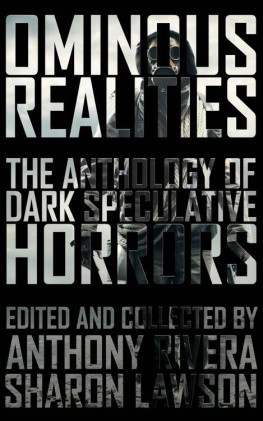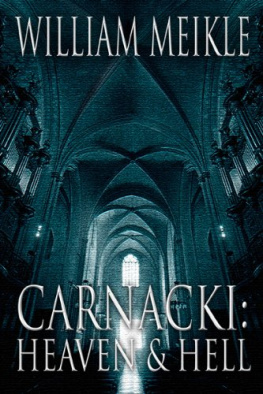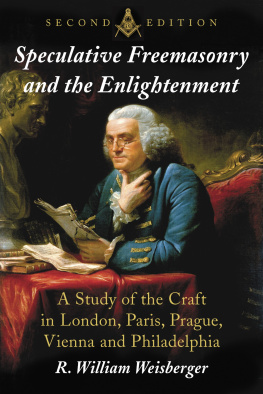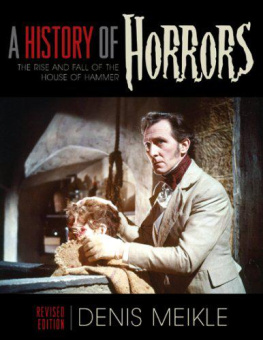

All stories contained in this collection remain the copyright of their respective authors. Additional copyright declarations are located
No part of this book may be used or reproduced in any manner whatsoever without written permission of the author or Grey Matter Press except for brief quotations used for promotion or in reviews. This collection is a work of fiction. Any reference to historical events, real people or real locales are used fictitiously. Other names, characters, places and incidents are products of the authors imaginations, and any resemblance to actual events or locales or persons, living or dead, is entirely coincidental.
OMINOUS REALITIES
ISBN 978-1-940658-04-9
First Grey Matter Press Electronic Edition
December 2013
Anthology Copyright Grey Matter Press
Design Copyright Grey Matter Press
All rights reserved.
Grey Matter Press
greymatterpress.com
Grey Matter Press on Facebook
facebook.com/ greymatterpress


Martin Rose
John F.D. Taff
William Meikle
Ken Altabef
Gregory L. Norris
J. Daniel Stone
Eric Del Carlo
Bracken MacLeod
Hugh A.D. Spencer
Edward Morris
Jonathan Balog
Ewan C. Forbes
Allen Griffin
Alice Goldfuss
Paul Williams
T. Fox Dunham
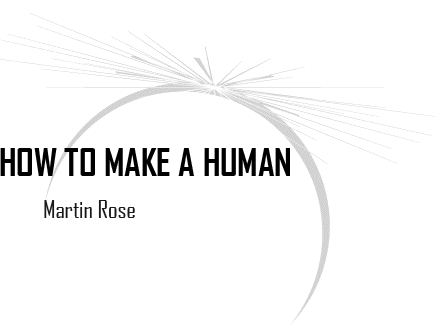
This story is not about Edward Dyer; but it is about his robots.
It is not necessary to know that Edward Dyer was an aloof gentleman with a penchant for cybernetics. He tinkered with electronics and ham radios, studied Morse code and the anatomy of the human body.
The outside world was of no concern to Edward Dyer. He progressed into advanced adulthood with his first cybernetic prototypes fully articulated; so when The End Of The World As We Know It arrived, he was more than content to lock himself in the storm cellar and continue to puzzle out his more intricate, life-sized models. He was teaching the first of them to say Daddy when the Earth shook with a sound of thunder, and he was buried down deep while Armageddon arrived.
No humans survived. If you believe the tourist guide versionRevelationsthen there was a great battle between Heaven and Hell. Armies of angels and demons on either side lay waste to the world. Human souls were divided between those who would return to paradise and those who would be damned.
No one ever said what would happen afterafter there were no humans.
Well, this story is about the afterafter Edward Dyer died quietly of starvation teaching his robots advanced forms of arithmetic, but most of all, after he taught them how to reproduce themselves, and gave them the most important blueprint of allhow to make a human.
* * *
Screams.
Bravo Dyer's shadow moved behind the frosted glass window of the Birthing Room door. Every robot in the room remained still and silent, amplifying the hysteria contained within the Birthing Room. They stood in line beside the walls and doors of the centuries-old, abandoned police station.
Romeo Dyer stood out in contrast in his black frock, the Roman collar like a white noose around his neck.
Edward Dyer had created each one of Romeo's brothers and sisters with unique programming, some to produce energy, others to teach, to gather information, and still more to protect. As each one fit a basic function, their needs became more refined with each robot he created, and he named each of his children with a letter of the alphabet in military fashion.
He made Romeo Dyer to look after their souls.
Romeo might have been distressed by the screaming from the Birthing Room, but those feelings eluded him; his circuits and machinery were cold and impersonal, without an inkling of happiness, remorse or regret. That he had no soul was irrelevant; he shepherded the others, a slave to his programming. He heard confession for sins they could not enjoy, granted salvation for a satisfaction that none of them felt. He mimed the righteousness of a priest like a child reading about sex in a textbookwith only a vague understanding of the carnal knowledge within.
Inside, his circuits were embedded with every translation of religious texts known to man, hidden gospels, Dead Sea Scrolls, fluent in Aramaic, Greek, Hebrew and a thousand dead languages. He knew every Psalm, every holy prayer, but he understood he was little more than an animated vessel, organic skin covering the angular planes of his alloy facial structure.
His silver, mercury eyes stared outward, calculating the notes of the screams, their pitch and distress.
After a moment, he turned and produced a revolver and began to load the chambers. His motions were calculated and business-like. None of his brothers and sisters beside him moved or spoke. Some were on stand-by mode, conserving their energy with a distant electrical hum.
The Birthing Room door opened. Bravo emerged. His lips pressed into a thin line in mock distress, displaying an emotion he did not have the power to feel. Romeo turned, the revolver in hand.
How are they? he asked.
Bravo adjusted his tie in meticulous fashion. A long smear of bilious, black fluid dripped down the shirt front, and he scraped at it with his fingernail. A gibbering sound escaped through the door before it snicked closed.
All failed, Bravo noted.
Romeo nodded. He snapped the revolver shut and spun the chamber, a rosary looped around his fingers. Beads pressed the skin between his thumb and the gun. Six bullets, for six demons occupied in six clones. His silver eyes matched the nickel-brushed finish of the gun and were just as cold.
He moved for the door when Bravo reached out, grasping his shoulder.
Can you do this?
Romeo paused. The rosary made a clicking noise against the gun barrel as it swayed. His silver eyes regarded the blurred forms beyond the frosted glass.
There are system errors. I can use other algorithms to patch up the contradictions. I'll run diagnostics during shutdown tonight.
His brother's concern was for Romeo's specific religious programming: Thou shalt not kill. While Romeo took confession and shepherded his robotic flock, he was left with no one to confess his own sins to, a problem Edward Dyer had not lived long enough to solve. He often pondered why Mr. Edward Dyer had seen fit to create him with a central processing unit obsessed with a soul and render it unable to possess one.
He was forbidden to break religious law; but they could not allow the clones to live, either. In this gap, Romeo was pulled to and fro by what could be classified as doubt, though he could only express it as a mathematical anomaly in his code.
Romeo breathed in, mimicking human stress, and opened the door.
* * *
Six humans were seated in a semi-circle, like a classroom of school children, as Romeo strode into the center, taking them all in with a sweep of his mercury eyes. This latest, failed batch of clones was only a fragment of the many they had created in their efforts to bring back the human race. He had entered this room 506 times, each event logged into his memory with computer-like efficiency. His face remained expressionless.
Next page
